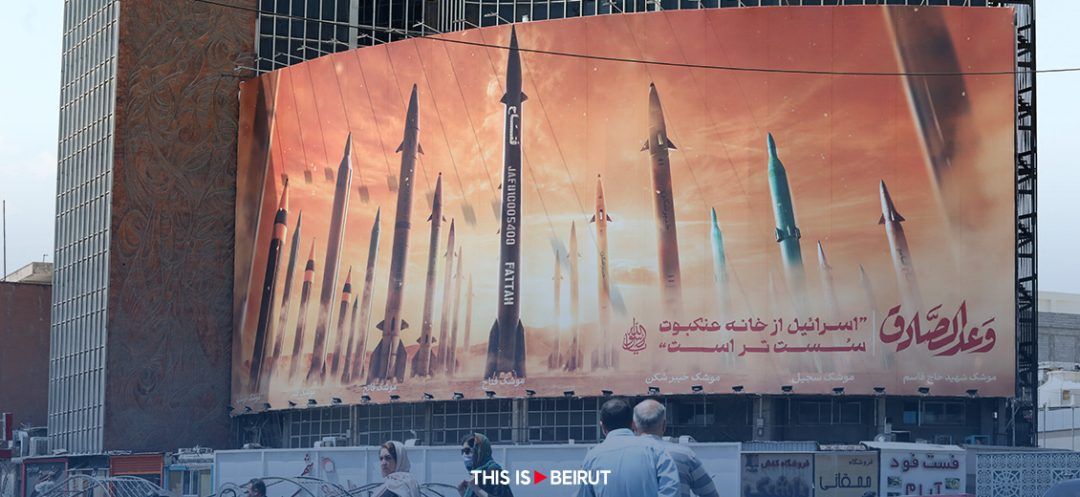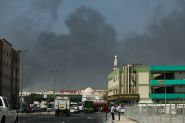- Home
- Middle East
- Europeans to Censure Iran's Nuclear Program, but US Opposed

©(ATTA KENARE / AFP)
European countries are hoping to censure Iran over its nuclear program despite US fears that it could further inflame tensions in the Middle East.
Britain, France and Germany will seek to censure Iran over its lack of cooperation with the UN nuclear watchdog at its board meeting on Monday, despite US opposition, diplomats told AFP.
According to the International Atomic Energy Agency (IAEA), Tehran is the only non-nuclear weapon state to enrich uranium to 60%, while it keeps accumulating large uranium stockpiles.
It is approaching the enrichment levels of 90% needed for atomic weapons. It is also well above the authorized 3.67% used for nuclear power stations.
Diplomats told AFP that submitting a motion against Iran at the Vienna meeting was driven by an “urgency to react to the gravity of the situation.”
At the last board meeting in March, European powers decided to shelve their plans to confront Iran due to a lack of support from Washington.
The United States denies it is hampering European efforts to hold Tehran accountable but fears that a censure could aggravate Middle East tensions ahead of presidential elections in November, diplomats say.
Cooperation between Iran and the IAEA has severely deteriorated in recent years, with the UN nuclear watchdog struggling for assurances that Iran's nuclear program is peaceful.
Diplomats say that maintaining the current policy of inaction amid Iran's escalation is no longer tenable, and the US position could change ahead of the vote scheduled for later this week.
In the meantime, the death of Iran's president Ebrahim Raisi in a helicopter crash last month has put negotiations on hold.
However, diplomats suggest that Iran is using the accident as an excuse to stall.
The confidential draft says it is “essential and urgent” that Tehran provides “technically credible explanations” for the presence of uranium particles found at two undeclared locations in Iran.
Furthermore, Iran has to “reverse its withdrawal of the designations of several experienced Agency inspectors,” and “without delay” reconnect the cameras used to monitor nuclear activities.
Iran has gradually broken away from its commitments under the 2015 nuclear deal it struck with the United States, China, Russia, France, Germany and the United Kingdom.
The landmark deal provided Iran sanctions relief in exchange for curbs on its atomic program.
But it fell apart after the unilateral withdrawal of the United States under then-president Donald Trump in 2018.
Efforts to revive the deal have so far failed.
Anne Beade, with AFP
Britain, France and Germany will seek to censure Iran over its lack of cooperation with the UN nuclear watchdog at its board meeting on Monday, despite US opposition, diplomats told AFP.
According to the International Atomic Energy Agency (IAEA), Tehran is the only non-nuclear weapon state to enrich uranium to 60%, while it keeps accumulating large uranium stockpiles.
It is approaching the enrichment levels of 90% needed for atomic weapons. It is also well above the authorized 3.67% used for nuclear power stations.
Diplomats told AFP that submitting a motion against Iran at the Vienna meeting was driven by an “urgency to react to the gravity of the situation.”
At the last board meeting in March, European powers decided to shelve their plans to confront Iran due to a lack of support from Washington.
The United States denies it is hampering European efforts to hold Tehran accountable but fears that a censure could aggravate Middle East tensions ahead of presidential elections in November, diplomats say.
'Essential and Urgent'
Cooperation between Iran and the IAEA has severely deteriorated in recent years, with the UN nuclear watchdog struggling for assurances that Iran's nuclear program is peaceful.
Diplomats say that maintaining the current policy of inaction amid Iran's escalation is no longer tenable, and the US position could change ahead of the vote scheduled for later this week.
In the meantime, the death of Iran's president Ebrahim Raisi in a helicopter crash last month has put negotiations on hold.
However, diplomats suggest that Iran is using the accident as an excuse to stall.
The confidential draft says it is “essential and urgent” that Tehran provides “technically credible explanations” for the presence of uranium particles found at two undeclared locations in Iran.
Furthermore, Iran has to “reverse its withdrawal of the designations of several experienced Agency inspectors,” and “without delay” reconnect the cameras used to monitor nuclear activities.
'Wider Impasse'
Iran has gradually broken away from its commitments under the 2015 nuclear deal it struck with the United States, China, Russia, France, Germany and the United Kingdom.
The landmark deal provided Iran sanctions relief in exchange for curbs on its atomic program.
But it fell apart after the unilateral withdrawal of the United States under then-president Donald Trump in 2018.
Efforts to revive the deal have so far failed.
Anne Beade, with AFP
Read more



Comments